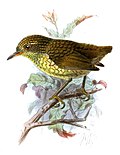| Sirystes | |
|---|---|
 | |
| Sibilant sirystes Sirystes sibilator | |
| Scientific classification | |
| Domain: | Eukaryota |
| Kingdom: | Animalia |
| Phylum: | Chordata |
| Class: | Aves |
| Order: | Passeriformes |
| Family: | Tyrannidae |
| Genus: | Sirystes Cabanis & Heine, 1860 |
| Type species | |
| Muscicapa sibilator Vieillot, 1818 | |
Sirystes is a genus of birds in the tyrant flycatcher family, Tyrannidae that are found in Middle and South America. They used to be all considered conspecific. Vocal differences were used to separated the superspecies into four distinct taxa.
